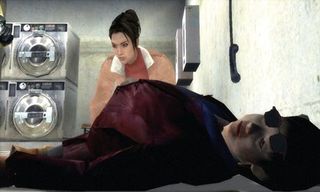A few years ago, a lovely chap writing a thesis on gaming visited PC Gamer to chat about what they believed made a great game. I remember incoherently trotting out the usual buzzwords: story, characterisation, freedom. In my head flickered Planescape, Deus Ex, System Shock 2... I really believed that story is all.
What a fool I was. How could I not see that story is what’s holding games back from true greatness? Show me your finest cutscene, your most shocking twist, your most moving endgame cinematic, and I will give you exactly the same response as I would to the worst, the most predictable, the most leaden. All it does is rub in my face all the things the game won’t let me do myself.
Worse, it forces the game down a path it’s simply not capable of walking convincingly. Even the best-written action-centric game still clings to the three-act structure of a movie - which means last-act escalation, raising stakes, excitement and tension above what’s gone before. In a movie, this involves the big setpieces being wheeled out, the rules of physics and logic discarded. In a game with a fixed control set, it’s trickier. A developer may decide to grant the player new abilities, or plunge him into a totally different scenario. This risks either incoherence and fizzle-out (eg, BioShock), or a sharp upwards turn in the learning curve - see Crysis’s sudden and punishing introduction of plane-flying.

Alternatively, the game can reduce the player’s options, enforcing a limited range of actions to ensure the final scenes play out as the story dictates. The very obvious example is quick-time events, a feeble excuse for showing almost anything on-screen, but requiring only that the player press a predetermined sequence of buttons - a thin veil of interactivity. Fahrenheit’s late-game frenzy of Simon Says, for example, but BioShock’s mechanical boss fight is a rarefied variant of the same crime. Rig it so a player can only press the keys you want and you can show anything on the screen. Dance, monkey, dance.
A third route still is to bombard the player with ever-harder odds - see Assassin’s Creed’s plunge into unsubtle melee misery in its final level, or Far Cry’s hatefully hard Trigen mobbing. It’s a lazy and archaic way to build to a narrative’s conclusion - creating tension by punishing the player. It can work the other way - Half-Life 2’s climactic citadel assault and super-gravity gun, for instance, which essentially turns the cheat mode on and successfully tricks you into thinking you’re a superman.
That’s a rare beast though, and also somewhat related to Valve’s prescient understanding that narrative needs to be dialed back and unobtrusive, rather than cruelly cracking its whip against the poor game’s flank. When story is relaxed, a game can be a game. When story dictates, the game tries to be something it isn’t, and fails. Think about games without story - Team Fortress 2, Audiosurf, Peggle - and how free they are from those terrible moments of collapse. Their only narrative is the one you create as you play. Desires and goals formed on the fly in direct response to what’s happening are infinitely more effective than Giant Endgame Boss With Lasers For Eyes.
What do you think? Is Alec crazy, or are games trying too hard to shoe-horn story in where it just gets in the way? Sound off in our forums.
May 16, 2008
